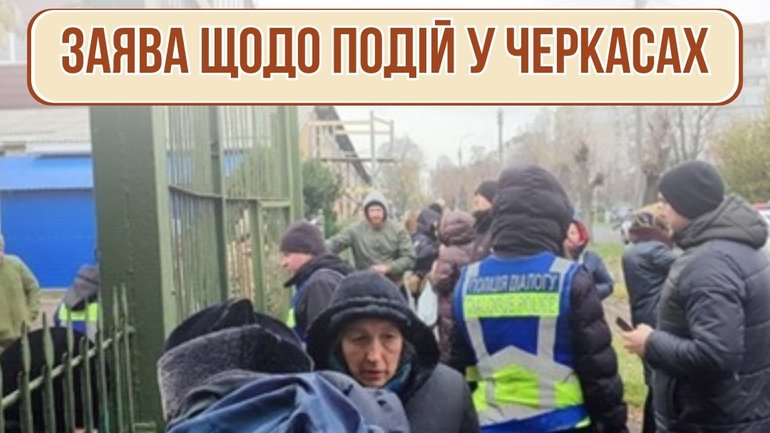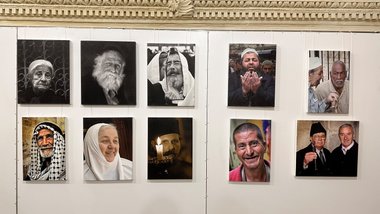Orthodox Church of Ukraine activists implore leaders to condemn violence during parish transfers

Amid increasing accusations of misconduct and violence during the transfer of parishes from the Moscow-backed Ukrainian Orthodox Church (UOC MP) to the independent Orthodox Church of Ukraine (OCU), a group of activists are requesting church leaders condemn any use of force (English translation here).
The group, called “10 Theses for the Orthodox Church of Ukraine,” arose in 2019 when they presented a plan of reforms to the just-independent Church, which received independence (autocephaly in church terminology) from the hands of the Ecumenical Patriarch Bartholomew.
Reacting to an incident in the central-Ukrainian city of Cherkasy, where OCU activists and Ukrainian servicemen breached a barricaded territory of a monastery to vacate it by force. The OCU group claimed they had rights to these premises, citing a decision of the parish community to leave the UOC MP and join the independent Orthodox Church of Ukraine. A standoff ensued, and at least two jaws of UOC MP priests were broken during the violent seizure of the UOC MP premises.
UOC MP claims, however, that the OCU did not lawfully gain rights to this territory because the decision was not made by parish members but by the regional community, meaning Ukrainians simply living nearby. This is a common accusation of the UOC MP amid its growing unpopularity in Ukrainian society and pressure on its church structures. Parish transfers from the UOC MP to the OCU, which sped up after Russia’s invasion in February 2022, have been marred by anger, chaos, and violence.
“Even though the main responsibility for the explosive religious situation in Ukraine lies with the leadership of the UOC MP, the use of physical violence in the transfer of churches to the OCU is unacceptable,” the 10 Theses appeal goes. “Conscious or unconscious, active or hidden support and emotional approval of such methods can lead to tragic consequences and even armed clashes on religious grounds. The situation is exponentially complicated by Russia’s full-scale war unleashed against Ukraine.”
“We call for an end to any attempts at forcible seizure of buildings and ask the leadership of the OCU to condemn them. The war for temples will not lead to the expansion and strengthening of the OCU, even if we have legal, moral, historical and social justice on our side,” 10 Theses stress and call upon all OCU faithful to intervene: “Inaction and irresponsible silence in such cases is tantamount to approval and complicity in violence.”
“In such a struggle between the OCU and the UOC, it is primarily Christianity in Ukraine that loses. Faith is not measured by the number of square meters in a cathedral or monastery. For our unchristian behavior, the Lord will devastate our temples,” the activists appeal.
At the same time, 10 Theses for OCU stresses that the primary fault for the religious tension in Ukraine lies with the UOC MP leadership, which keeps telling its believers that the OCU are schismatics despite receiving church autocephaly in order to preserve loyalty to their own structure. This places UOC MP faithful between a rock and a hard place as they are forced to explain their affiliation with church structures of the invading country:
“The UOC MP leadership is ready to sacrifice Ukraine for the sake of its corporate interests and unhealthy fantasies, stubbornly refusing to admit that their long-standing flirting with Russia was the most fatal and tragic mistake of this church structure.”
The UOC MP still maintains canonical subordination to the Moscow Patriarch, who blesses Russia’s war against Ukraine, despite claiming to have broken ties in May 2022, and Ukraine is eyeing a law that would request the UOC MP cease any connections with Russia or be taken to court.
The OCU was envisioned to end the long-standing schism between the Moscow-backed Ukrainian Orthodox Church (in canonical subordination to the Moscow Patriarchate; UOC MP) and the unrecognized Ukrainian Orthodox Church (Kyiv Patriarchate). However, in their majority, the UOC MP snubbed the invitation to unite and continues to campaign against the OCU.
Having had priority status up till 2014 in Ukraine, the UOC MP erected many temples and still has more parishes than the OCU. Despite this, the number of its faithful has plummeted with Russia’s invasion of Ukraine; a January 2023 poll found that currently 4% of Ukrainians consider themselves a part of the UOC MP, while 41% professed allegiance to the OCU.
Conflicts over church temples, the majority of which belong to UOC MP, have therefore become common in wartime Ukraine amid accusations that the church contributed to Russian aggression through the promotion of Russian World ideology.
Full English translation of the appeal:
Statement of the initiative group of clergy and laity “Ten Theses for the Orthodox Church of Ukraine” regarding the events in Cherkasy
There are roads that seem right to a man, but their end is the way to death. (Prov. 16:25)
For what does it profit a man if he gains the whole world but loses his own soul? (Mark 8:36)
On November 20, our community was deeply disturbed by the violent confrontation between supporters of the OCU and the UOC MP that took place in Cherkasy. The bone of contention was the Church of the Nativity of the Blessed Virgin, which belonged to the religious community of the same name. This parish switched to the OCU, and representatives of the UOC MP were allegedly not happy about this and refused to vacate the premises. Then OCU activists, along with unidentified individuals, resorted to physical violence.
We, members of the “10 Theses for the OCU” initiative, feeling responsible before God and the Church, anxious about the Ukrainian state, declare the following:
Even though the main responsibility for the explosive religious situation in Ukraine lies with the leadership of the UOC MP, the use of physical violence in the transfer of churches to the OCU is unacceptable. Such violent actions involving a "combat wing", and especially servicemen who went through the front lines, are unacceptable, no matter what patriotic slogans they hide behind.
Numerous property conflicts feed the Russian anti-Ukrainian propaganda and discredit Orthodox Christianity both among non-believers and believers. Moreover, conscious or unconscious, active or hidden support and emotional approval of such methods can lead to tragic consequences and even armed clashes on religious grounds. The situation is exponentially complicated by Russia's full-scale war unleashed against Ukraine.
We understand and share the pain, despair and emotional state of many Ukrainians who would like the history of the Moscow Patriarchate in Ukraine to finally end. We understand the needs of every real religious community to have a church where the sacraments are performed and prayers are heard. But Christians are followers of the New Testament of Love, and this imposes enormous responsibility on us towards our own conscience, towards Universal Orthodoxy, towards Ukrainian society, and towards the international community. We believe it is unacceptable to support, provoke, approve or in any other way tolerate “Lynch courts" without exhausting all legal civilized means of establishing order and restoring justice.
At the same time, we emphasize that the primary responsibility for the tense church situation lies with the church leadership of the UOC MP. It is their policy of procrastination that has placed the irrational loyalty of believers to their canonical structure above Christian virtues. People found themselves in a psychological abyss between the artificially inspired fear of mythical "schismatics" and the terrible realities of Russian aggression, and lost the ability to make adequate decisions. In fact, the UOC MP leadership is ready to sacrifice Ukraine for the sake of its corporate interests and unhealthy fantasies, stubbornly refusing to admit that their long-standing flirting with Russia was the most fatal and tragic mistake of this church structure.
We call for an end to any attempts at forcible seizure of buildings and ask the leadership of the OCU to condemn them. The war for temples will not lead to the expansion and strengthening of the OCU, even if we have legal, moral, historical and social justice on our side.
Fanning the flames of a church war in Ukraine strikes first and foremost at our Christian mission, and forceful actions when changing jurisdiction destroy the prospects for resolving inter-church confrontation that has lasted for over 30 years. We call for an end to manipulative means of hindering the free choice by UOC MP communities of canonical jurisdiction. Moreover, we call on the OCU to show patience, restraint, wisdom and mercy, and not force them to love "over the knee."
We call on the relevant state bodies, primarily the State Service for Ethnopolitics and Freedom of Conscience, to develop effective mechanisms for regulating the process of transitions between different religious structures. The picture of confrontation provides an opportunity for Russian propagandists to once again declare "religious persecution" in Ukraine, while the current inertia of state bodies contributes to the incitement of interfaith hostility and discrediting the good name of Ukraine on the international stage.
For their part, lawmakers could offer clearer and more flexible opportunities for religious communities that have split up in the process of changing jurisdiction and have not found common ground on property issues to use churches. For example, establish rules and conditions for the alternate use of the temple, or compensate the part of the community left without a place of prayer. This will make the new communities more responsible for their extra-legal actions.
Once again, we emphasize: fights and conflicts over church buildings disgrace Orthodox Christianity. Moreover, in such a struggle between the OCU and the UOC, it is primarily Christianity in Ukraine that loses. People coming to Christ are more important than the walls surrounding them - even if these are the walls of the church. Faith is not measured by the number of square meters in a cathedral or monastery. For our unchristian behavior, the Lord will devastate our temples, "taken away from the enemies."
To whom much is given, much will be required. The OCU is charged with special responsibility: having received recognition after decades of persecution by the UOC MP, not to succumb to the desire for revenge and not become a persecutor itself or a state church. After defeating the dragon, do not become the dragon itself. Any incitement of hatred will sow seeds of evil that will be reaped not only by Orthodox Christians, but by the entire people of Ukraine. Strategically, everyone loses.
We, as representatives of the OCU, first of all have a moral obligation to appeal to the leadership of our Church - to intervene in this particular situation. Inaction and irresponsible silence in such cases is tantamount to approval and complicity in violence.
To sign, fill out the form. Your name will be added to the statement.
Members of the "Ten Theses for the Orthodox Church of Ukraine" initiative group:
- Alya Shandra, editor-in-chief of Euromaidan Press
- Archimandrite Cyril Hovorun, Doctor of Philosophy
- Rev. Andriy Dudchenko, Doctor of Philosophy, Secretary of the Synodal Theological and Liturgical Commission of the OCU
- Tatiana Derkach, religious observer and publicist
- Volodymyr Volkovskyi, Candidate of Philosophical Sciences
- Andriy Smyrnov, Doctor of Historical Sciences, Director of the Center of St. Cyril Lukaris
- Rev. Heorhiy Kovalenko, Rector of the Open Orthodox University of St. Sophia the Wisdom
- Daryna Morozova, Doctor of Philosophy
- Viktor Tregubov, Major of the Armed Forces of Ukraine, Master of Religious Studies
- Oleksandr Sahan, Doctor of Philosophy, Professor
- Kostiantyn Sigov, Lecturer at NaUKMA etc










